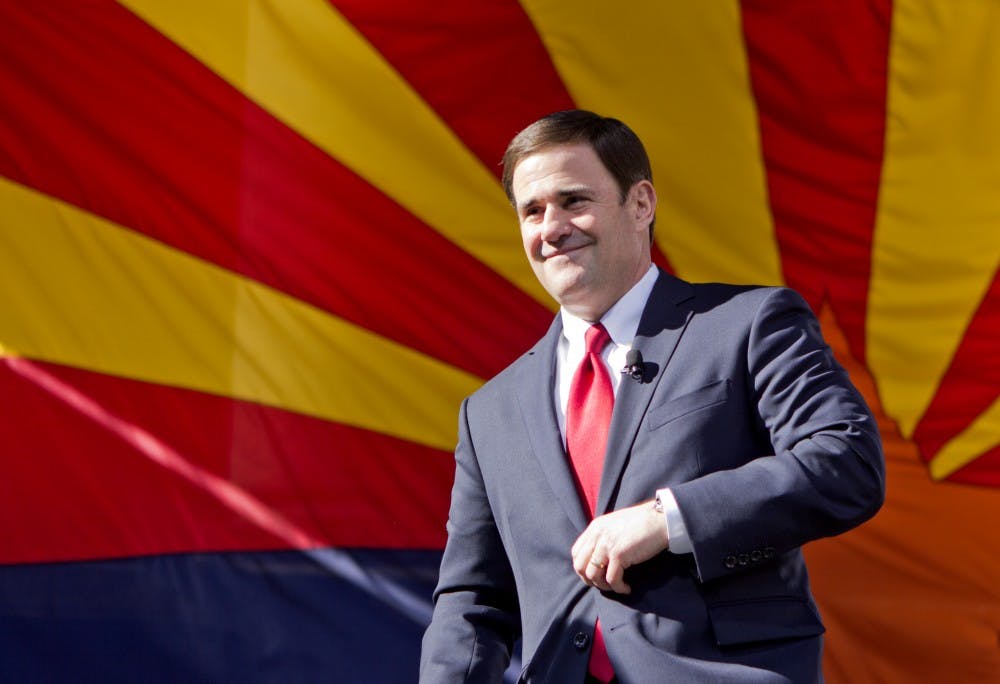Tempe voters aiming to increase transparency in government passed a ballot initiative known as the Keep Dark Money out of Tempe Local Elections charter amendment on March 13 with 91 percent approval.
The initiative would mandate that the source of donations made to local political campaigns exceeding $1000 be made public. But on April 6, Gov. Doug Ducey signed House Bill 2153, effectively overriding the ordinance.
The bill prevents local government or political entities from requiring tax-exempt organizations to report the sources of political donations or register as a Political Action Committee.
But the city sent its proposal to Ducey, where it awaits his signature. Ducey doesn't have to sign the measure immediately and could drag his feet, waiting until the bill goes into effect 90 days after the end of the legislative session.
Joshua Sellers, an associate professor at the Sandra Day O’Connor College of Law said that there are arguments for both sides of this debate. Supporters of the bill, Sellers said, are advocating for the privacy concerns of donors.
“Let’s say you’re a business owner and you wanted to support a particular candidate, that could end up hurting your business because people would patronize you because they disapproved of the candidate that you supported,” Sellers said.
But opponents of it, he said, feel the bill would make it harder to hold politicians accountable and lessen transparency in elections.
“It’s important to know who’s funding our elections because we want to keep our politicians accountable,” Sellers said.
Nicholas Weller, a fourth year doctorate student at the School of Sustainability and a campaign volunteer for Tempe City Councilwoman Lauren Kuby said that as a student voter, the ballot initiative is a part of the civic process, and it’s an important piece of legislation because it opens a door for dialogue between candidates and constituents.
“I want to know what kind of issues they’re standing up for and how they’re fundraised,” Weller, also a Tempe resident, said.
Weller said that dark money in elections tips the scale in regards to which form of speech is more valuable by enabling these groups to continue "pushing money" into lawmakers' pockets.
Kuby said that there is a strong defense for Tempe fighting this bill and going forward with the initiative.
Kuby said that because Tempe is a charter city, the bill, which doesn't explicitly mention charter cities, does not apply to it.
“Charter cities have the explicit authority to regulate in areas of local concern, and we can have laws that contradict state laws as long as we can establish there’s local concern and not a state-wide concern,” Kuby said.
Kuby said the argument for protecting non-profits and businesses is "disingenuous" because it’s not the nonprofits that are spending the majority of this money. Rather, she claims they’re "corporate based, it’s the Koch brothers, it’s the bigger groups.”
Randy Keating, a Tempe City councilman said that transparency regarding donors in local elections is important because people deserve to know “who’s paying to play” in elections.
“To me it’s a moral and good governing imperative that we disclose these donors,” Keating said.
Sellers said that college students are probably more likely to view issues of transparency in government as important because “the nature of money in politics has changed,” especially the operations of powerful political interest groups.
Keating said that if ASU students engaged in activism, they could have the power to get Ducey’s attention for this initiative because he’s “risk averse.”
John Christoph, a Tempe resident, second year doctoral student in the School of Earth and Space Exploration and a campaign volunteer for Lauren Kuby, said that students should send messages directly to Ducey and legislators who support the bill, rather than reaching out to lawmakers who already oppose it.
“For any student that wants to get involved, there are ample opportunities to do so within local government and the state government," he said. “The people who are in office in the legislature representing Tempe, the people who are in the city council and the mayor’s office, they are all actively invested in getting ASU students to have a voice and to have more participation in local and state politics.”
“Being involved with local issues is a good way to get your feet in the water on being a good citizen,” Weller said. “The vast majority of government that you interact with on a day-to-day basis is usually your city. So these are the issues that actually impact students' daily lives.”
Reach the reporter at ajmistry@asu.edu or follow @jay_mistry52 on Twitter.
Like The State Press on Facebook and follow @statepress on Twitter.




